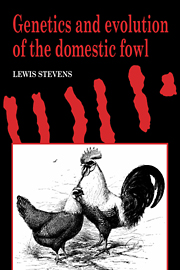Book contents
- Frontmatter
- Contents
- Preface
- 1 The history and evolution of the domestic fowl
- 2 The cellular organisation of genetic material
- 3 The transmission of inherited characters
- 4 Sex determination and sex-linked inheritance in the domestic fowl
- 5 Linkage and chromosome mapping
- 6 Genes controlling feathering and plumage colour
- 7 Muscle, nerve and skeleton
- 8 Lethal genes in domestic fowl
- 9 Quantitative genetics
- 10 Protein evolution and polymorphism
- 11 Immunogenetics of the domestic fowl
- 12 Gene cloning, sequencing and transfer in the domestic fowl
- APPENDIX I Linkage groups and the chromosome map in the domestic fowl
- APPENDIX II Oncogenes
- APPENDIX III The Chi squared (χ2) test
- APPENDIX IV One letter amino acid code
- APPENDIX V The genetic code
- Glossary
- Index
8 - Lethal genes in domestic fowl
Published online by Cambridge University Press: 22 September 2009
- Frontmatter
- Contents
- Preface
- 1 The history and evolution of the domestic fowl
- 2 The cellular organisation of genetic material
- 3 The transmission of inherited characters
- 4 Sex determination and sex-linked inheritance in the domestic fowl
- 5 Linkage and chromosome mapping
- 6 Genes controlling feathering and plumage colour
- 7 Muscle, nerve and skeleton
- 8 Lethal genes in domestic fowl
- 9 Quantitative genetics
- 10 Protein evolution and polymorphism
- 11 Immunogenetics of the domestic fowl
- 12 Gene cloning, sequencing and transfer in the domestic fowl
- APPENDIX I Linkage groups and the chromosome map in the domestic fowl
- APPENDIX II Oncogenes
- APPENDIX III The Chi squared (χ2) test
- APPENDIX IV One letter amino acid code
- APPENDIX V The genetic code
- Glossary
- Index
Summary
Introduction
Genes may be transformed by spontaneous mutations, which occur at a low frequency in the range of 1 in every 2 × 10-4 to 4 × 10-10 meiotic divisions. Agents such as UV light, X-rays and certain chemicals known as mutagens increase the frequency of mutation. Mutations involve changes in the structure of DNA and hence the information coded in the DNA sequences. Different types of changes can occur such as the removal or addition of a base, or the inversion or transposition of a segment of DNA. Mutation is generally thought of as a random process, although certain positions in DNA may be more sensitive to change. Because of the random nature of any change most mutations are detrimental to the organism concerned. It is somewhat analogous to making a random replacement of a component in a computer; it is much more likely that the computer will perform less well, than that it will show additional capabilities. Very occasionally mutants may produce an improved genotype that will have a selective advantage in the environment. This is of great importance in the process of evolution.
Many mutations are pleiotropic, that is, they are wide ranging in their effects on the phenotype, and it is in most cases difficult to establish the nature of the primary effect.
- Type
- Chapter
- Information
- Genetics and Evolution of the Domestic Fowl , pp. 127 - 136Publisher: Cambridge University PressPrint publication year: 1991



